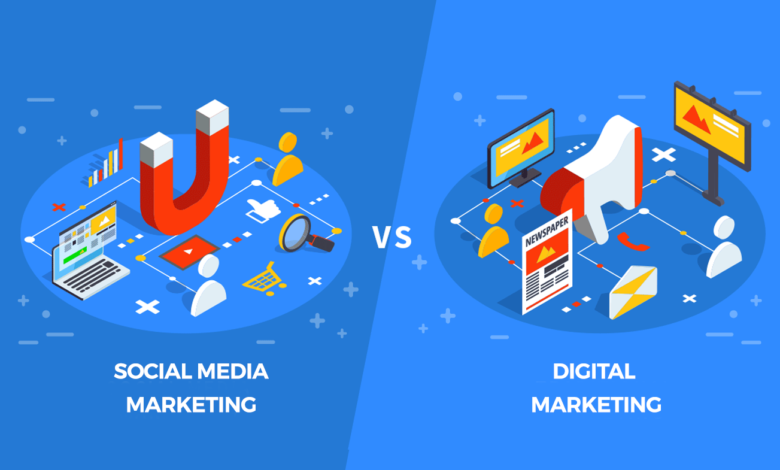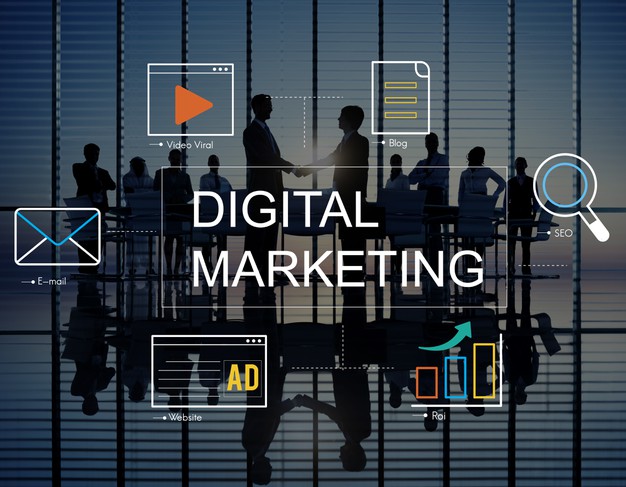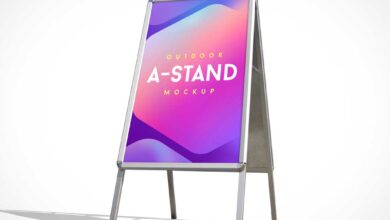What are the Differences Between Social Media Marketing and Digital Marketing?

When it comes to the various marketing segments for the new age, digital and social media marketing come as the top names. Based on the requirements of the business, people use digital and social media marketing interchangeably. However, there is a common belief that participating in social media is complete digital marketing, whether it is only a part of it. To know what marketing strategy to use for your marketing method, it is important to understand the difference between digital and social media marketing.
To know more about it take help from https://www.onlinemarketinggurus.com.au/.
Here is the difference between the two types of marketing method:
Usage of the platform

Social media marketing derives its very name due to the platform it thrives with. It is the specific type that uses social sites to gain traffic and enhance customer engagement. It is focused on thriving on platforms like Facebook, Instagram, Twitter, LinkedIn, etc.
However, digital marketing refers to the technique which targets the users through all the electronic channels. The sphere of digital marketing is much larger, and it accommodates all the virtual marketing efforts. Social media source: also comes under the umbrella term of digital marketing. It also includes website optimization with the marketing strategy, PPC, content, advertising on digital devices, and many other marketing techniques.
Reach of the platform
When it comes to the reach of the platform, social media marketing is limited in every aspect. It is only focused on reaching the audiences who are having social accounts. People who are present on Facebook, Instagram, Linked In and Twitter, will be able to see your marketing efforts.
Digital marketing, on the other hand, is focused on a much wider audience base. It not only relies upon internet-based platforms. It has a much wider spectrum as it can reach out to a wider audience base online. Hence, it becomes easier to target digital marketing when you want to incorporate a wider customer base into your business and to enhance more traffic to your brand.
The focus of the marketing method

Social media marketing has a very straightforward focus on its quality of content. Content is the king in social media marketing. It is simply impossible to target the audiences without a significant content presence. People in social media are random scrollers. They are not at all going to spend much time in your marketing unless they find it interesting and valuable for their purpose. This is why all successful digital agencies focus on evaluating the content for social media, which is unique and attractive.
Digital marketing is much focused on creating banners that can have a lasting impression on the mind of the audience. Efforts are scaled enough to place the customer’s intent with the impressive build-up, which offers the businesses better reach to the conversion.
Way of engagement
Social media marketing is much focused on evaluating the engagement with the consumers. It is much of a direct approach to reach out to the customers and connect with them. Brands that participate in social media marketing are more exposed to the customers. They engage in direct conversation with the customers and add value to the business based on customer feedback and engagements.
Digital marketing, on the other hand, engages with people with an indirect approach. It reaches out to people through various channels like TV, mobile apps, radio, emails, websites, search ads, etc. Here people can get the idea of the presence of the brands. However, it is less communicative compared to social media marketing.
Speed of marketing

Since social media comes up with a more direct approach, it is easier for marketers to reach out to the target audience in a much speedy way. Users here respond actively. They also participate in sharing, liking, and commenting on the posts, which engages a lot of people and easily reaches out to more and more audiences, which boosts the enhancement of the business.
Digital marketing, on the other hand, is not capable of reaching out to people within seconds. It takes time and effort to reach out to the people, which makes it slower than social media marketing.
Topmost platforms for social media marketing and Digital Marketing?
Digital Marketing components are quite similar to every internet-based company that we generally know about. So, among them, a few of these are a part of digital marketing campaigns like:
Search Engine Marketing: It works through Adwords or the implementation of SEO and content strategy.
Social Media promotion: As mentioned above, it is a part of digital marketing. Thus it involves advertisements on Facebook and promotions on other social media platforms.
Mobile market promotion: These are done through pushing advertisements on apps available on Google Play Store and Apple Store.
Email marketing: Promoting products through sending emails as a part of marketing campaigns.
Now in terms of social media marketing, platforms like Facebook, YouTube, WhatsApp, Instagram, TikTok, Snapchat, Pinterest, Reddit, Twitter, and Quora play a major role in promotion and connection with the audience.
Which one is more important?

Social Media Marketing is about connecting and presenting the brands and creating alertness in the public’s mind. It is therefore perfect for entrapping a large portion of the audience as most people are daily active on social media platforms.
Whereas, Digital Marketing efforts are more driven to deliver conversions along with promotions, which is both on social media platforms and others platforms as well. So, it depends on the type of brand one has.
Conclusion
While social media marketing is a part of digital marketing, both can act contradictory when it comes to performance. Rather it would be fair enough to say, social media marketing is one of the various ways of digital marketing which is faster and convenient when it comes to engaging with people. Both digital and social media marketing needs to be there in your business to take complete advantage of new-age marketing.



